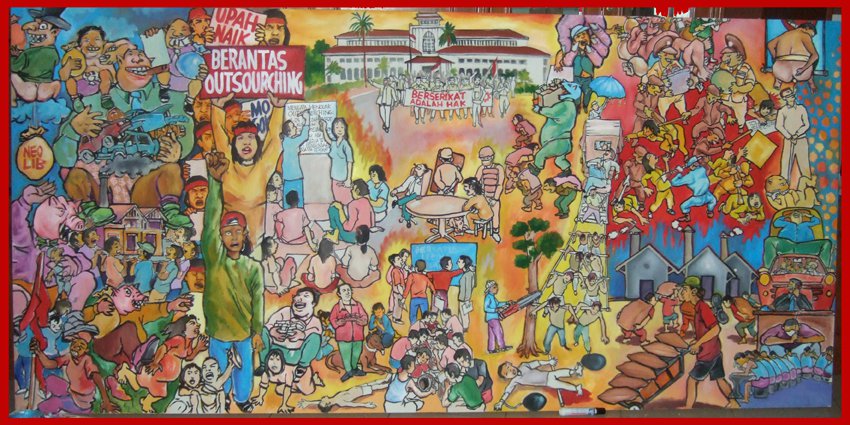 |
| ARMP in one of their consolidation next to the beach |
The beach-side town of Parangtritis, on the southern coast of Yogyakarta, is currently the site of a protracted and bitter struggle over land between the local government and people.
The south coast is an important asset for the tourism industry in Yogyakarta. Foreign investors plan to build a 68.2 hectare golf course, a 55 hectare resort and three- and four-star hotels. This will result in thousands of home evictions.
Since 2006, at least 250 families have been evicted and their homes destroyed. They have been moved to temporary accommodation in the area. Ninety-nine other families are threatened by eviction in this area. Families were given 1.5 million rupiah (about A$190), far less than is needed to purchase a new home. Instead, they were offered a tiny shack, on which they may have to pay rent in the future.
Local government here can expel people legally as a result of Yogyakarta remaining the last province in Indonesia still governed by a pre-colonial monarchy. Sultan Hamangkubuwono is king and also governor of the area. He can still use an old law that defines the people who live on the land as “squatters” who can be evicted. This is directly contrary to the 1960 Agrarian Reform Act, which states that land that has been inhabited for more than 15 years belongs to the people who have lived on it. Parangtritis communities have lived here over the last 15-30 years and built their own village.
Attacking sex workers
Fahmi Aslihul Alia, known as Yayak, is a leader of the struggle and also a member of the KPRM-PRD (Committee of the Poor People-People’s Democratic Party). Yayak explained that the main pretence for the proposed eviction is to eliminate prostitution from the area. Prostitution, although widespread throughout Indonesia, is illegal.Sex workers, who are one of the most powerless groups in Indonesia, are a very easy scapegoat for the government. As part of a campaign by local government, women working as prostitutes have been solicited by a police officer posing as a client only to be fined after they accepted. Furthermore, while local police and the government say they want to eliminate prostitution, they do not offer any form of alternative employment or training. The local government is clearly trying to drive a wedge into the community, turning the villagers against prostitutes.
However Yayak explained that the villagers and sex workers have been able to form an alliance to fight together against the proposed eviction. This campaign has been organised through the People’s Alliance Rejecting Eviction (ARMP), the left front of the local branch of the network People’s Alliance of Radical Action, which fights for the urban poor, farmers, workers and students and consists of 13 organisations and 250-300 people with the main platform being anti-imperialism and national liberation.
Protest demonstrations
 | |||
| In one of ARMP 'middle of the night protest action' against reactionary repression |
Yayak explained that the KPRM-PRD has maintained its intervention into the struggle from the beginning and tried to radicalise people through the process. Through fighting alongside the villagers, the KPRM-PRD aims to educate about social issues, law and politics as well as raise awareness about the relationship between local struggles and the struggle for socialism. It hopes to consolidate the ARMP as a permanent organisation and to unite forces nationally.
Repression has occurred from both civilian militias led by reactionary bourgeois parties and from the military. There were incidents of intimidation and destruction of protest camps in June and August.
The struggle in Parangtritis mirrors a process occurring throughout Indonesia. While exact numbers are difficult to find, the Centre on Housing Rights and Evictions reported that more than 12,000 people were evicted in Jakarta alone between July and August 2008. In Indonesian cities, evictions are justified on the basis of “land reclamation, environmental conservation and public order”, while evictions in rural areas are conducted for infrastructure development, tourism, mining and forestry.
Forced evictions will most likely increase if the Indonesian government joins the Reduced Emissions from Deforestation and Forest Degradation (REDD), a US$350 million World Bank initiative, which aims to pay poor countries in exchange for making their forests unavailable for logging and mining. In a letter to the Indonesian government in March 2009, the UN Committee on the Elimination of Racial Discrimination expressed concern that REDD is very open to corruption, for example by companies seeking to gain compensation for establishing commercial plantations, and may lead to indigenous peoples being denied access to their land. There are already more than 20 REDD projects in Java, Kalimantan, Bali, Sumatra and Papua.


1 comment:
Thanks for the story. The dull comfort of Australia needs these sharp awakenings. It's inspiring to see people organise
Post a Comment